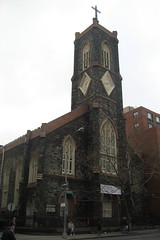 Image by wallyg via Flickr
Image by wallyg via Flickr
To proved that we believe in God?
Here's what the Catechism of the Catholic Church says:
2177 The Sunday celebration of the Lord's Day and his Eucharist is at the heart of the Church's life.
"Sunday is the day on which the paschal mystery is celebrated in light of the apostolic tradition and is to be observed as the foremost holy day of obligation in the universal Church."[110]
"Also to be observed are the day of the Nativity of Our Lord Jesus Christ,
the Epiphany,
the Ascension of Christ,
the feast of the Body and Blood of Christi,
the feast of Mary the Mother of God,
her Immaculate Conception,
her Assumption,
the feast of Saint Joseph,
the feast of the Apostles Saints Peter and Paul, and the feast of All Saints."[111]
2178 This practice of the Christian assembly dates from the beginnings of the apostolic age.[112] The Letter to the Hebrews reminds the faithful "not to neglect to meet together, as is the habit of some, but to encourage one another."[113]
Tradition preserves the memory of an ever-timely exhortation: Come to Church early, approach the Lord, and confess your sins, repent in prayer.... Be present at the sacred and divine liturgy, conclude its prayer and do not leave before the dismissal.... We have often said: "This day is given to you for prayer and rest. This is the day that the Lord has made, let us rejoice and be glad in it."[114]
2180 The precept of the Church specifies the law of the Lord more precisely: "On Sundays and other holy days of obligation the faithful are bound to participate in the Mass."[117] "The precept of participating in the Mass is satisfied by assistance at a Mass which is celebrated anywhere in a Catholic rite either on the holy day or on the evening of the preceding day."[118]
2181 The Sunday Eucharist is the foundation and confirmation of all Christian practice. For this reason the faithful are obliged to participate in the Eucharist on days of obligation, unless excused for a serious reason (for example, illness, the care of infants) or dispensed by their own pastor.[119] Those who deliberately fail in this obligation commit a grave sin.
2182 Participation in the communal celebration of the Sunday Eucharist is a testimony of belonging and of being faithful to Christ and to his Church. The faithful give witness by this to their communion in faith and charity. Together they testify to God's holiness and their hope of salvation. They strengthen one another under the guidance of the Holy Spirit.
2183 "If because of lack of a sacred minister or for other grave cause participation in the celebration of the Eucharist is impossible, it is specially recommended that the faithful take part in the Liturgy of the Word if it is celebrated in the parish church or in another sacred place according to the prescriptions of the diocesan bishop, or engage in prayer for an appropriate amount of time personally or in a family or, as occasion offers, in groups of families."
![Reblog this post [with Zemanta]](http://img.zemanta.com/reblog_e.png?x-id=a118b14c-2da1-486d-b1cc-b6819ebe4f13)
![Reblog this post [with Zemanta]](http://img.zemanta.com/reblog_e.png?x-id=05e78329-42bb-4e34-b6e3-8bad915cd266)




